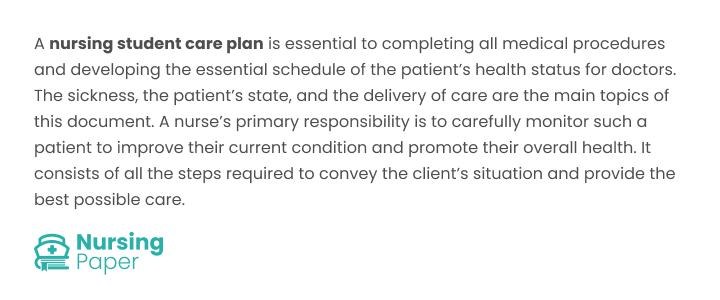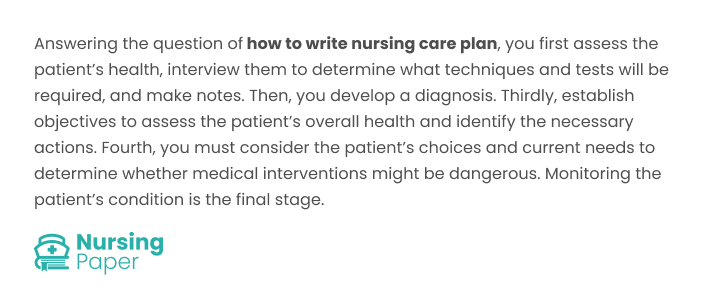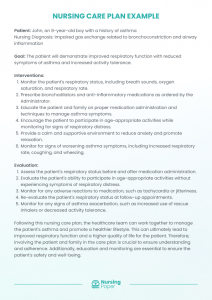Get Expert Help on Nursing Care Plan Writing & Gain Perfect Outcomes
Let our verified MSN & DNP experts create top-quality care plans for you.
Calculate Nowtexts
Plagiarism can create a lot of trouble for students. We check every task two times with contemporary software to ensure originality.
Only practiced and educated writers can perform tasks in nursing well. We cooperate with experts who hold either a master’s or doctor’s degree.
Our service is focused on the nursing field, and all the writers are experienced professionals from a multitude of nursing subjects.
We know how critical timely delivery is to learners, so we make sure to always finish orders before the deadline. No matter what you have, we’ll do it on time.
We make good on our promises and deliver each nursing care plan on time – that’s why people choose us.
Order via chatWhat Is a Nursing Care Plan?
A nursing care plan is a written piece that describes the care provided to a patient based on an assessment of their health, diagnosis, and personal preferences. It also includes detailed information about interventions, outcomes, desired goals, and changes and necessary updates to the nursing process to adjust intervention plans according to the patient’s condition changes.
Unlike standard medical records, writing a nursing care plan involves regular reviews, updates, and changes necessary to improve patient health. This may include information about medication interventions, dietary and lifestyle modification recommendations, follow-up plans, or referrals to other healthcare providers.
Understanding the foundational knowledge rooted in the nursing theory is also essential for formulating a care plan. Learn what is nursing theory.
Speaking of what is a nursing care plan in the context of practical application, it is a multifunctional tool that allows nurses to provide an integrated approach to supplying high-quality healthcare. It helps ensure all aspects are considered, and the patient’s needs are met, including current and future ones.
Find out the price of your nursing care plan
Why Students Should Master Writing a Nursing Care Plan
Nursing care plans (NCP) are essential tools in providing nursing services as it helps to create quality and continuous care personalized to patients’ demands. NCP assists in clarifying care goals and prioritizing nursing interventions, as well as helping with their management, revision, and canceling following current care goals and needs.

Being a part of the nursing process, care plans are drawn up after the nurse has determined the nursing diagnosis consistent with the NANDA-I. It’s needed to ensure consistency in used terminology and facilitate effective communication between all healthcare providers. Thus, writing care plans assures patients get the best quality nurse service, regardless of case complexity and duration. And healthcare providers benefit from the standardization of work instructions that improve communication and the ability to simultaneously cover a broader range of nurses’ everyday tasks.
Benefits of Creating Nursing Students Care Plans
Faced with the constant need to create nursing student care plans, it becomes a routine and even unpleasant duty for many nurses. However, it is worth remembering that this provides many advantages that must be noticed and remembered.
Some of the general advantages:
- Definition of the nursing role: Care plans help define nurses’ unique and independent role in the overall health and well-being of patients without relying totally on physician direction or intervention.
- Provision of comprehensive care: Writing a care plan helps structure nursing intervention sets and tailor them to current goals, providing standardized and precise settings across various environments – from admission to discharge.
- Documentation purposes: Recording nurse’s care measures not only makes the data available for further study, quality improvement & communication but also provides evidence that the nurse care provided was legal, safe & effective.
Benefits for nursing interventions management:
- Plan & revise interventions: It is much easier to follow the established route, which is the nurse care plan. This allows nursing staff to develop a straightforward service-providing algorithm that can be instantly reconfigured depending on the patient’s needs.
- Measurement & management of outcomes: Nurse plans help track the patient’s progress and make necessary adjustments to planned nursing interventions based on the current health status and goals defined.
- Adoption of new care methods and tools: Individual nursing care plan examples can serve as a starting point for helping the next patient with similar problems. It can dramatically simplify dealing with complex and atypical cases, as well as help disseminate professional knowledge and nurse skills acquired.

Communicative opportunities that nursing care plans provide:
- Provision of connection between staff: The presence of nursing care plan samples greatly simplifies the management of patients requiring long-term and consistent nurse intervention and the involvement of several specialists.
- Coordination between multiple disciplines: Nursing plans may include data on the intervention of other specialists, including interdisciplinary ones. It contributes to better coordination between nurses from different departments or specialists of different profiles and adaptation of methods to common goals.
- Patient involvement: Involving patients in writing a nursing care plan allows nurses to build relationships with them and their families and better tailor nursing specialists’ work to the individual needs of the client, their values, lifestyle & culture.
Choose the Needed Nurse Care Plan Type
There are two main types of nurse care plans (NCPs) – informal and formal, which, in turn, can be divided into standardized and individual. Informal NCP is considered the simplest, as it is only a general plan of action or a list of tasks that nurses draw up for themselves. Formal NCPs are writing nursing care plans designed manually or computerized to organize and manage patient data officially.
Standardized plans are created to describe nursing care for groups of patients and define prescriptions for methods and activities applicable to everyone as part of the daily routine. However, professional nurses also need to write care plans that are individualized, taking into account the unique needs of patients or needs that go beyond the standardized NCP.
Standardized Care Plans
A standardized nursing care plan is a guideline pre-designed by healthcare facilities and nursing staff to ensure that patients with a particular condition are able to receive consistent and quality service. Such programs provide adherence to minimum care criteria, promoting the efficient use of nurse time by eliminating the need to develop repeated joint activities for many clients in the nursing department.
Although standardized nursing care plan examples are not adapted to a patient’s needs, they can be a starting point for developing individualized plans, considered unique demands via particular cases.
Individualized Care Plans
In addition to adopting a standardized NCP, an individualized one may include extended measures and nurse techniques that meet individual patients’ unique needs and requirements. This approach helps nurses to provide more holistic and personalized nursing care that leverages unique goals, strengths & traits.
Writing a nursing care plan that is well adapted to the patient’s needs is also becoming an increasingly common task for students and nurse practitioners, as it improves the quality of the healthcare environment, the services provided, and patient satisfaction.
Tips on Care Plans Individualization
- Conduct a comprehensive assessment of the patient’s health data, including medical history, general health status, and the health goals they set for themselves.
- Involve patients in writing nursing care plans and designing interventions based on their goals, needs & preferences.
- Tailor interventions to the specific needs of patients, taking into account not only their basic demands but also their emotional needs and environmental conditions.
- Regularly reassess and update the nursing care plan as the patient’s health status and goals change.
How to Write a Care Plan – Bases & Key Components
Before embarking on nursing students care plans, knowing what type of NCP you need is worth knowing. Will you create an outline for yourself to stick to during your nurse shift? In this case, feel free to choose an informal one. If this should be a report with the assessment of the patient’s condition, creating a formal individualized NCP is worth considering. You can also make your life easier with our quick tips on how to write a nursing care plan from the Q+A section.

To gain a better understanding of how to write a care plan, it is worth considering its main components of it:
1. Assessment of the patient’s health status
This includes nursing diagnostic reports and medical results developed on the basis of a nurse’s subjective and objective assessment of the general condition and separate areas in particular – e.g., physical and functional, emotional and psychosocial, cognitive, cultural, and environmental.
2. Nurse diagnosis
It is the next component of the nursing care plan, which is based on data from the health status assessment and describes a specific health issue.
3. Patient outcomes that are expected
This describes the specific short or long-term nursing goals expected to be achieved through nurse interventions.
4. Nursing interventions (with or without rationales)
These are specific nurses’ actions that need to be taken to achieve the desired goals and address the established nursing diagnosis. It also needs evidence-based explanations and the latest nurse practices and guidelines.
5. Evaluation and adjustment
This part of the nursing student care plan is necessary to monitor and evaluate the patient’s progress as a result of interventions to further adjust them in accordance with the changed health status and nursing goals.
What Format to Choose to Write Care Plans
The writing format of the NCP is a multi-column table containing data on nursing diagnosis, interventions, and outcomes. The number of columns and sizes can differ, depending on the goals nurses set for themselves to write care plans. Typically, there are three standardized formats:
- Three-column nurse care plans are considered the most minimalistic because it consists of nursing diagnosis, interventions, and evaluation & outcomes.
- Four-Column NCP is more extended by displaying ‘Evaluation’ as a separate column.
- Student nurse care plan is the most expansive and detailed since it is also a teaching aid for students.
The set of parameters for nurse student NCPs is usually set to be custom and often includes additional columns for information about ‘Rationale’ or ‘Scientific Explanation’ that comes after ‘Interventions.’ In this part of the student nursing care plan, learners need to state the scientific principles that guided them and explain the choice of interventions. In addition, professors often require nurse students to have their nursing plans handwritten.
Take a Look at Great Nursing Care Plan Examples
Before proceeding with directly creating your NCPs, we recommend that you pick up on a few good nursing care plan examples for visualization and better assimilation of information. Besides, it can help you better articulate your needs when you ask for assistance from a nursing care plan writing service.
However, it is worth remembering that even the best nursing care plan samples are not the ultimate truth and should always be tailored to your unique needs and nurse program requirements. E.g., you may discover the advantage of splitting a table into 6-7 columns while your institution requires 5. And it would be best if you considered this because, in the future, you may often need to write care plans in this format. Therefore, using nursing paper examples is better for general understanding than a direct copying.
How to Write a Nursing Care Plans Step by Step
Now it’s time to create your own NCP, and there is something you can do it.
Step 1: Collect and Evaluate Patient Data
Before starting to write care plan, gather data about your patient and their health status using nurse assessment and data collection methods – physical assessment, history, interviews, diagnostics, and review of medical records. This may also include information about associated risks and environmental conditions. All this information is necessary to make a nursing diagnosis and plan further interventions. Methods of collecting information and data for nursing assessment can be chosen independently or in accordance with certain assessment formats offered by your agency or nurses’ school.
Step 2: Analyze Data Obtained and Formulate a Nursing Diagnosis
Once you have collected all the necessary information about the patient’s health, you need to organize and structure it in a nursing care plan. Systematize and analyze this data to formulate a nursing diagnosis and set up priorities & intervention nurse goals.
Next, you need to establish nursing diagnoses based on these data, using the NANDA-I classification, which is used to standardize and unify the definitions and nurses’ solutions to actual or potential health problems.
Step 3: Set Up Priorities
The nursing care plan prioritization phase involves establishing a specific order of nurses’ interventions to address nursing diagnoses. This is where you determine which actions have the highest priority and which issues require priority attention. For convenience, you can group and rank priorities of nursing goals as high, medium, or low.
Maslow’s Hierarchy of Needs is often used in a nursing care plan to help with prioritization, allowing care to be planned based on specific patient needs. This includes several needs/goals in descending order of priority:
- The primary physiological needs must first be airway-breathing-circulation, nutrition-elimination, sleep, sex, shelter, and exercise.
- Protection and safety – creating a safe environment and preventing the risk of injury.
- Belonging and love – establishing social relationships and trust, avoiding isolation.
- Self-esteem – establishing a sense of belonging to society, gaining control over one’s body, and adopting habits and appearance.
- Self-actualization – spiritual and emotional growth, unlocking potential, empowering environment.
Modern nursing care involves a patient-centered approach that considers not only the satisfaction of basic needs but also the values and beliefs of the patient. Using these as evaluation factors, you can learn how to write a nursing care plans that enhance cooperation with the patient, which will bring maximum mutual benefit.
Step 4: Establish Goals and Outcomes You Want to Achieve
Once the nursing diagnosis and priorities have been determined, goals and desired outcomes must be set. You should describe your expectations for implementing the selected and planned nurses’ interventions here. At the same stage of the nursing care plan, the criteria for assessing the patient’s progress are also set, as well as the ways to solve problems, the timing, and the motivation for obtaining a sense of achievement are agreed upon.
Expected results and nurses’ goals should be patient-centered and measurable, about achieving achievement, achieving and solving actual problems. A large part of the nurse’s work time is spent on emergency care, and most of the goals in the nursing care plan are short-term (several hours to days). Long-term (several weeks to months) ones are less common and individual in the presence of chronic problems or long-term treatment.
Additionally About SMART Goals
The modern healthcare industry offers many valuable recommendations and guidelines to improve the efficiency of nurses & healthcare professionals. SMART goals are one of those. This abbreviation indicates the characteristics you can apply to the desired outcomes shown in your nursing care plan.
- Specific goals that are clear, sensible, and targeted are the most significant and influential.
- Meaningful or Measurable goals make it easy to track progress and clarify the milestones you will pass on your path to achieving results.
- Action-Oriented or Attainable goals are flexible and achievable, encouraging and motivating to continue.
- Results-Oriented or Realistic goals should consider the availability of resources and build on the conditions of the current situation without embellishment.
- Time-Oriented or Timely goals imply the presence of parameters for setting a specific deadline, allowing nurses to bind certain outcomes to particular time frames.
Step 5: Identify and Plan Nursing Interventions
The selection and appointment of nurses’ interventions also require an integrated approach involving the consideration of their types:
Type 1 – Independent Interventions
Independent nursing interventions that nurses can determine and prescribe based on their own judgment, skills & knowledge. This may include emotional and physical care, ongoing assessment and training, and referral to other healthcare providers or profile specialists. Often this type is part of the informal nursing care plan.
Type 2 – Dependent Interventions
Dependent nursing interventions are such because the physician prescribes and regulates their content and procedures. This may include instructions for taking medications, administering therapy, administering diagnostics and treatment, fulfilling activity and dietary prescriptions, and so on. However, all such data must be included in a nursing care plan since the nurses are responsible for monitoring the implementation of these prescriptions and their results.
Type 3 – Collaborative Interventions
Collaborative nursing interventions involve other nurses from the same team or multidisciplinary healthcare providers. Such actions are developed and regulated jointly with other nurses & medical specialists.
When students and first-time nurses are assigned to write care plans, they may also be required to describe scientific explanations or rationales. This is not mandatory for all NCPs, but it helps a lot with analyzing pathophysiological and psychological principles guiding the choice of nurses’ interventions.
Step 6: Monitor the Progress and Evaluate Outcomes
As part of this planned and targeted nursing activity, you should monitor the progress of the selected nurses’ interventions and evaluate progress toward the goals you have set. This also allows you to determine the effectiveness of the nursing care plan in general and nursing processes in particular to determine the need to continue, stop or change the selected interventions in time.
Step 7: Put All This Information in Writing
In real life, the nursing care plan is part of the official hospital records, the creation and management of which are governed by the policies adopted by this institution. This also becomes part of the permanent medical record, which other nurses can use to plan future interventions.
Different healthcare institutions and programs may set their own requirements for writing a nursing care plan, reporting rules, and format. However, most of them are designed so nurses and students go through interrelated stages and nursing processes sequentially. Often, a five-column NCP format is used for this, but we advise you to stick to the one installed and regulated by the requirements of your nursing program.
Get Qualified Help From the Best Nursing Care Plan Writing Service
Perhaps having a trusted writing assistant is among the best choices for students and aspiring practitioners. It is much easier to stay calm, knowing that a specialized nursing care plan writing service, which can take over some of your tasks anytime, covers your back.
That’s why we’re here to help you 24/7, offering help covering most nursing papers and writing assignments. It doesn’t matter to us how complex your case is and how urgently you need to prepare a nurse’s report – proficient writing experts can easily handle any nursing care plan, meeting your deadline.
There are no amateurs or versatile copywriters here – only experienced specialists with proven backgrounds, field expertise & verified nursing degrees. They are all nurse practitioners, graduates, and representatives of top programs who know precisely what is expected of you and how our nursing writing services can improve your academic performance.



